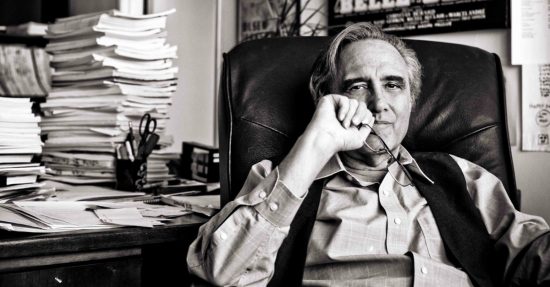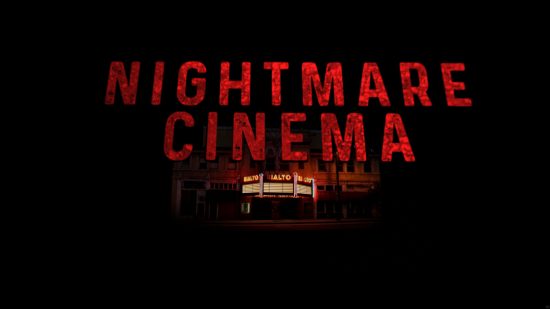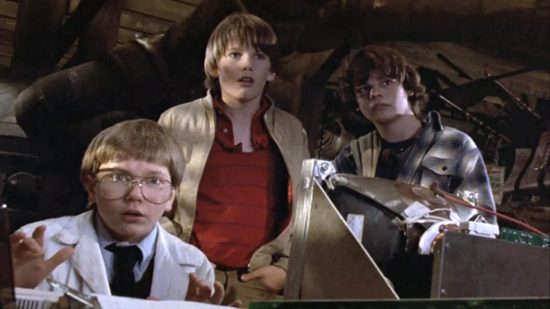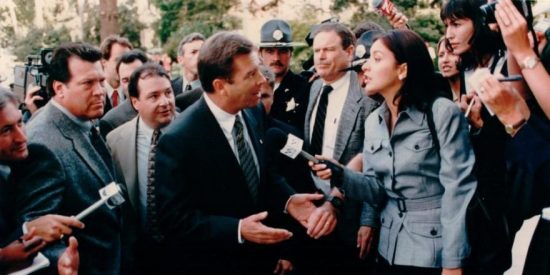Joe Dante talks Nightmare Cinema, The Movies That Made Me and more
Joe Dante doesn’t need any introduction: with movies like Gremlins and The ’Burbs, he’s one of the great cult filmmakers of the 20th century, and he has also done some excellent movies for television (including The Second Civil War, and his two episodes of the anthology series Masters of Horror). Speaking of anthology projects, Dante has a short film about the perils of plastic surgery in Nightmare Cinema, which should be coming to a cinema near you in the near future. With Josh Olson, he co-hosts The Movies That Made Me, a podcast where they interview actors, directors and journalists about films that inspired them.
I had the great pleasure of interviewing Dante for the second time recently to discuss his podcast, Nightmare Cinema and a few other topics regarding his career, recent films, the movie business, and the current state of streaming classing films due to the closure of FilmStruck. The Movies That Made Me has featured guests like filmmakers Daniel Waters, Uwe Boll and Keith Gordon; and actors like Robert Forster and Ron Perlman, and is the official podcast of Trailers From Hell (available on iTunes.)
How do feel about FilmStruck closing down?
I did some sort of event for them about a year ago, and they were very nice and they give me a subscription. The material they have is great and the quality is excellent, and some people said they preferred it to Netflix because there were more classic movies available. Netflix started out with a lot of classic movies and then sort of moved into their own original productions, and that stuff fell by the wayside. Amazon actually has more old movies than Netflix, but FilmStruck was a great idea, and once they merged with Turner and got Criterion involved, it was a treasure trove. It’s very sad there doesn’t seem to be enough support for film history to keep something like that afloat.
When they brought it over here for six months, they didn’t have any of the special features that they had on the States site, which was incredibly disappointing.
Even here I was surprised that the story itself gained a lot more attention than the actual site because I saw notations in Internet columns like “I had never heard of this FilmStruck thing before, sounds great! I would’ve joined if I had known.” So I think there was culpability in them not being able to advertise it correctly. It wasn’t well known enough, and it needed time to develop and to sink in. There is also so much else competing for people’s attention that it’s difficult to make that kind of impression in any quick amount of time. I guess the powers that be knew that the ownership is changing hands, and just decided this was something that wasn’t moving fast enough or generating income. They were aware the audience was very loyal, but you can’t deny it was a niche audience.
I hope maybe with the merger they can relaunch it or have some kind of catch-all streaming service, despite my issues with the monopolisation of the internet.
I’ve encountered a lot of people who said, “I was thinking of getting rid of my DVD collection because I was going to stream everything.” Now they are all thinking twice about that. The death of any more outlets for these kinds of films is always troublesome. In trying to launch something like that, if it’s FilmStruck or some other company, the problem is allocating all those films. The great thing about FilmStruck is you had TCM behind it, which owns two-thirds of all the movies ever made in Hollywood, along with Warner Archive and Criterion. You are going to have to try to find a way to combine all of those places again, and I’m not sure legally how that even works, it must be very complex.
What can you tell me about your new project—how did you get involved with Nightmare Cinema?
I’ve always been a fan of what they call portmanteau horror films, the first and best being Dead of Night, and there was a brief vogue in the ‘40s and ‘50s of multi-story movies. It became a bit of a sub-genre, and the Italians were particularly fond of multi-story pictures. I think when Amicus was around, it was a viable alternative for them to hire a lot of actors for very short amounts of time to do multi-story horror films, so the genre really picked up. When you look at the cast of something like Asylum or Tales that Witness Madness or any of those pictures, they have an amazing array of talent. It’s because they worked for very brief periods and they still had the name recognition. The downside to all of these story movies is that they are essentially uneven because of something being more popular. Nonetheless, I’ve always been a fan, and there is something very attractive to a director in trying to tell a story in half an hour instead of stretching it out to 90 minutes with three acts.
I was gung-ho when Mick Garris suggested that we do this film, and his original idea was he wanted it to be an international film, which it kind of is. It was a sort of an offshoot of the Masters of Horror series that we did, his hope was you would do anther another series using filmmakers from all over the world. Nobody seemed to want to fund that, so he kept that idea in his back pocket, and it finally ended up being Nightmare Cinema. Naturally, there are two American directors, I think because of the financing, but he did get his wish of trying to internationalise the film with the presence of the other directors. Nobody was told what they had to do, and I think the framing story was concocted after production because everybody was allowed to do whatever story they wanted to do. It’s turned out quite well: I’ve seen it at several screenings at different festivals, and audiences seem to enjoy it.
Were the scripts around for a while, for example as a possible feature, or were they newly written for this project?
No, I think almost all were written for the film, except maybe the one Mick did was written for a feature and then shortened. Everybody was given the chance to do whatever story they wanted to do.
How did Richard Chamberlain get involved? He’s a weird choice, but he’s fantastic in it.
I had this problem with The Howling when a long time ago there was a character who was seemingly a nice doctor who turns out to be the villain. I went to Patrick Macnee: I thought that he was somebody who was identified as being a good guy and could also play menacing. That worked out very well. In this case, it was sort of the same problem. It’s a very slight story, and in order for it to work, you need to trust the plastic surgeon. Since Richard Chamberlain began his career as Dr. Kildare, he certainly has the “doctor moves” down. He had been kind of out of the business for a while, and I had been a fan for a long time. I had always enjoyed his performances, particularly his Richard Lester movies (The Three Musketeers, Petulia) and his Ken Russell movie (The Music Lovers) of course, which is fabulous. I got hold of his agent and managed to get to talk to him, and he thought it would be fun to do something like this. He turned out to be the perfect choice, because he is both reassuring and, towards the end of the movie, pretty scary.
Why wasn’t Dick Miller in Nightmare Cinema? It almost didn’t feel like a Joe Dante film without him!
First of all, he is more or less retired, but he has come out of retirement for a couple of pictures. It’s a small story with only four or five characters, and there really was no part for Dick. He certainly wasn’t going to play one of the nurses, and certainly wasn’t going to be the doctor or the boyfriend.
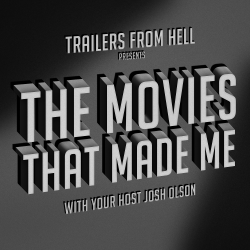 Everyone seems to be doing a podcast now, so it makes sense that you and Josh Olson would get in there. When did you come up with the idea for The Movies That Made Me, and how long ago did you start recording episodes?
Everyone seems to be doing a podcast now, so it makes sense that you and Josh Olson would get in there. When did you come up with the idea for The Movies That Made Me, and how long ago did you start recording episodes?
I must confess that I wasn’t a huge podcast listener, because I don’t drive, and I think most people who listen to podcasts listen in the car. When it was first suggested by some of our Trailers From Hell people that we have a podcast, Josh Olson, who wrote A History of Violence and is one of our commenters, offered to host the podcast. I couldn’t really see how I could say no because he is doing all the work. I show up and I talk with the guests and stuff, but I don’t have to prepare or plan anything. He has taken it all on his own shoulders, I think he was particularly clever with his choice of for the basis of the podcast, which is The Movies That Made Me. One of the reasons we got so many interesting guests on to sound so unusual is because we don’t do the standard interview where they talk about their work or their career, but they talk about the movies that made them. We have ended up going into areas that these people don’t usually get asked about because they are talking about somebody else’s work, which is fascinating. The variety has been remarkable, and we’ve had some really good guests—and the podcast is quite popular. People who have tuned into one tend to tune into the rest of them. We are up to… golly, I don’t know how many we’ve done now, maybe 20 or 30. We are still going, we do a couple of podcasts a week.
Which guest were you most surprised by so far?
I don’t know if we were surprised, but there are people I’ve always wanted to talk to, like this week we had Robert Forster, the actor, who I’ve known casually for years but never worked with. He was quite interesting: he comes at his movie lore from obviously an actor’s point of view. Ron Perlman, who is coming up later [the Perlman episode has since been released] is somebody I’ve worked with, and again, a very bright and articulate guy who is fun to listen to. That’s really the key to this whole thing: “is this a fun conversation to have?” And I’m there physically, and I get to see the people and see their reactions and stuff.
Who would be the guests who have not appeared who you would most like to talk to – one living and one dead?
Well dead [laughs], I mean, come on! Me and Mike Fenton would have two cast lists, we would have the live cast list and the dead cast list. The dead cast list would be all the people we thought would be great in the movie but were no longer alive. It was always better [laughs] than the live cast list! Obviously there are a lot of filmmakers I would’ve loved to have talked to. The usual suspects, Hawks, Hitchcock and that crowd. A lot of really interesting actors, some from the ‘30s would be really interesting, but that’s kind of a fantasy. We are stuck in the world which we’re in and all that entails. The trick is to just find people who are interesting to talk to and haven’t gone over this material before. You get some people talking and they’ve switched into autodrive, they are telling stories they’ve always told. It’s not as interesting as getting people who’ve never been asked these things or even thought about them. As difficult as it is, we try to stay away from politics, but in today’s world, it’s almost impossible.
I loved the one with Uwe Boll, that was pretty special!
Uwe is quite the character, he is the template of the kind of people we would like to get more of.
What’s next? Have you been hired to do any more TV episodes or new films?
I’ve haven’t done much TV lately because I’m a little too old to fit the definition of what’s being asked for. I still have movie projects, and I have my Roger Corman movie that I’m still trying to get made, The Man With Kaleidoscope Eyes, about him taking LSD when he made The Trip. It’s still funny, and we did a live reading a year and a half ago out in Hollywood with the cast and it was very successful. We have managed to get some backers on board, and we are trying to find a way to make the picture for an amount of money that makes sense, which is difficult because it’s a period picture. Just hiring all those old cars is expensive, and the town doesn’t look anything like it did in 1966, but we haven’t given up.
Have you seen any movies or TV shows you’ve liked recently?
I just saw Drew Goddard’s new movie, Bad Times at the El Royale, which I thought was really, really good. It’s a worthy follow up to The Cabin In The Woods, which I think is a trend-setting movie, even though it was on the shelves for a year—but I think it’s a major film in the genre. This is a slightly different genre, but it’s a terrific film and really, really well made. Definitely worth seeing.
What did you think of Ready Player One?
It was a bit too much of a good thing for me.
I felt like it was Spielberg doing a Joe Dante movie.
Well, doing a lot of them. It had a lot of amazing things in it, but in total it just seemed like overkill to me. If I made it, it would’ve been shorter!
I’ve never asked you anything about Gremlins—is there anything you’ve never been asked?
I somehow doubt it [laughs]!
Where do you see the exhibition of films going at this point?
I think there will always be theatres as long as there are kids who want to get away from their parents. As far as the kind of movies I was making in the ‘80s, if they are made today, they are made in an incredibly expensive ramped-up style with five climaxes, when one would’ve done in the old days. The regular bread-and-butter movies, standard keep the lights on movies, are migrating definitely to television. It’s amazing how many art theatres have managed to survive because those kinds of movies just don’t make enough money to justify their theatrical release. They almost always end up going to video or going to streaming, the economics of the business have changed immensely to the point where everyone is confused, and they don’t really know where it’s headed or what to do about it. Is it going to be virtual reality? But maybe not because it’s very difficult to tell a story in virtual reality. Is it going to be interactive? But again, it’s difficult, I’ve seen several interactive movies where you get to choose something that happens, but to do that you shoot five or six times the movie you’ve already shot. It’s also a very complex kind of storytelling, so I’m not sure that’s going to catch on. I think it’s going to plod along and people will be more and more homebound, they will be watching things at home.
If you were in charge of one of the big cinema chains, what would you do differently?
I would probably be a complete failure at it! I would want to revive old films—and they do occasionally. They revive Bullitt or Psycho or something that’s famous and run it for one night so people can see it in the theatre. I always thought, if I had a television network I would go one night a week where you would only run programming as it was in 1960, and it would be more interesting then what’s on today.
What’s your favourite cinema currently?
There is a place up the street from me called the Arc-Light, which is nice, but of course, it’s like an airport like all the other theatres, with millions of screens. I grew up in a one-screen theatre where there was only one theatre in town. We went to the movies and they changed Sunday to Tuesday, and Wednesday and Thursday were different movies, and Friday and Saturday were different movies. Always double features, and that was enough! I was the only kid who went to the movies every weekend, and it’s not quite the same. The moment when the lights go down is still the same, and the moment of anticipation where you think “maybe I’m going to see something great” is still there, but the experience is completely different from when I first discovered movies.
You’ve worked a lot with child actors. What do you look for when casting kids in a film?
You want to get kids who are natural. There was a period where all the kids you could hire were these sort of Disney Kids Channel graduates who’ve been taught to be very cute by their parents. They had all these acting tricks, which were fairly unpleasant. So I’ve had a lot of luck with child actors: with Explorers, Ethan Hawke just walked in off the street with another kid who was an actor. Ethan wasn’t an actor at all, but he just seemed to have a nice personality and was cute and funny so we were, “let’s have him read,” so he read and he ended up—this kid from Connecticut with no particular experience—getting the lead in a Paramount picture. These things do happen, but child actors come in batches, and sometimes it’s very difficult to find the actor you want because they just get spoilt.
I hope he gets an Oscar nomination for First Reformed, that was a powerhouse performance.
I hope so too, he deserves it.
What trailer are you are currently trying to locate for Trailers From Hell but having a hard time finding?
I’ve been trying to find… there are a whole bunch of trailers that have just disappeared, mostly from the ‘30s. There is no trailer for the W.C Fields movie It’s a Gift, which is a great comedy. There is no real trailer for The Bride of Frankenstein, because the only one that exists was cut down to 60 seconds for television. There are later films I’ve been trying find, like Lilith, the Warren Beatty/Jean Seberg movie. Sometimes things just fall through the cracks, and so there’ve been a number of pictures we’ve been trying for years to find the trailers for—the movies are available and popular, but the trailers are M.I.A.
What film are you most shocked about it not having a DVD or Blu-Ray release?
I don’t know, most things from 70, 80 years ago that we thought we would ever see are out there thanks to Warner Archive, and they’re going down to the vaults and finding them. Obviously, it would be nice to find the uncut print of The Magnificent Ambersons or the preview version of Frankenstein Meets The Wolf Man, but I wouldn’t want to hold my breath waiting for those.
I have to ask about The Second Civil War, about a buffoon politician who builds a wall to keep immigrants out. It all sounds so familiar… how does it feel to have predicted Trump?
Well, you know, every year it becomes more and more prescient, and besides the TV screens in it, it looks like it could’ve been made yesterday. And a lot of people in the movie aren’t with us anymore… I swear this movie is happening or going to happen, we are so close to that kind of situation here in America, right now. It just astonishes me. It is probably my least-seen movie, but that’s because it was made for HBO and they don’t do much with their old movies. It is, however, available on Amazon Prime, so people can see it if they know about it. But most people don’t know about it.
Have you ever had any pushback from studios about the not-so-subtle political content in your films?
No, not really, the only pushback I had was when I did Homecoming for Masters of Horror, which was an anti-Iraq war movie. A lot of former fans of mine said they would never watch another movie of mine and would destroy all their discs of my movies. That’s the only time I’ve really encountered that.
I thought maybe Small Soldiers might have faced some issues.
The movies I make, the political content tends to be coded, not really on the surface. So, you can make some points in a movie like Small Soldiers, which a lot of people at the studio don’t really know you’re making.
Halloween is coming up—what can you recommend as a good spooky film that people may not have seen?
There are lots of movies! Any Val Lewton movie is a great movie for Halloween. but one of my favourite horror films of all time is The Innocents, based on the Henry James story and directed by Jack Clayton. It’s not a slam-bang-jump scare movie, but a truly creepy and scary experience that sends chills down your spine.
You can follow me here.

